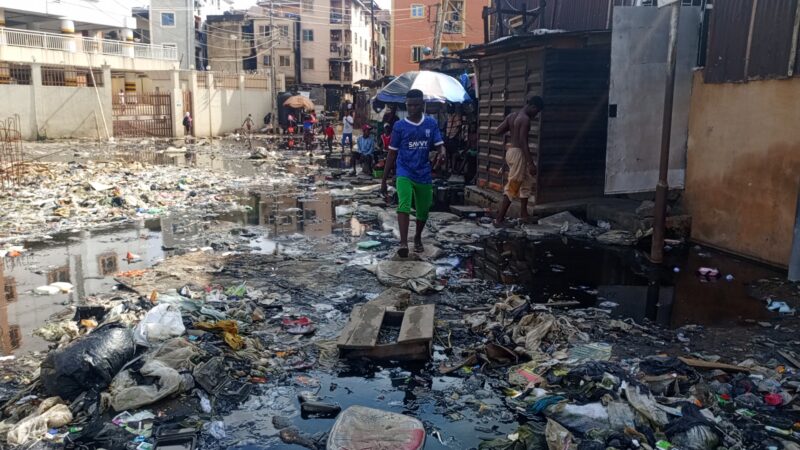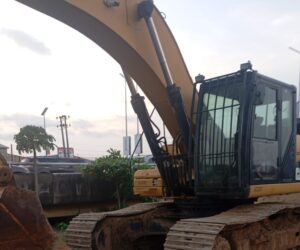Residents of Lagos Island, Lekki, and Ikota have decried persistent flooding that left their homes, schools, and businesses submerged after heavy rainfall earlier in the week, even as the state government defended its response efforts.
At Jankarra Market and Itafaji, stagnant water lingered days after the downpour, disrupting activities at shops, schools, bakeries, and places of worship.
Residents said the foul-smelling pools were becoming a health hazard.
“Our condition is caused by ongoing drainage works. Even when it doesn’t rain, the water refuses to go. We are worried about sicknesses,” Abdulkareem Hammed, a resident, told PREMIUM TIMES on Friday evening.
Another resident, Kunle Sodiq, added that he could only access his house through stagnant, dirty water.
In a statement on Friday, the Commissioner for Environment and Water Resources, Tokunbo Wahab, defended the state government’s efforts, stressing that flooding in Lagos was driven by geography and climate realities rather than political failings.
He explained that Lagos, like Venice, Bangkok, and Jakarta, is a low-lying coastal city prone to “tide-locking.”
“When heavy rain falls at the same time as a high tide, drains cannot empty fast enough into the lagoon or ocean,” he said. “It’s like trying to pour water uphill. The water backs up until the tide recedes.”
Mr Wahab said this was the case in Lekki, where intense rainfall coincided with high sea levels.

Flood control strategy
The commissioner outlined the government’s three-part approach: temporarily storing rainwater in estate lakes or basins, widening and clearing drainage channels, and installing pumps or one-way valves in low-lying areas.
He said maintenance and enforcement had restored more than 40 kilometres of canals, while 218 new drainage projects covering about 1,500 kilometres were underway.
A new pumping station on Lagos Island, he added, was undergoing tests at Ilubirin.
Mr Wahab explained that near-term measures include clearing choke points in Ajiran and Agungi, installing debris screens on culverts to catch plastic waste, and piloting estate lakes to absorb stormwater.
He also said longer-term plans involve building pumped drainage cells, restoring wetlands, and updating building codes to require stormwater detention in new housing estates.
“Floods are driven by physics, not politics,” he said. “Our plan is to store, move and control water—backed by maintenance, enforcement and early warning.”
Mr Wahab tied flooding to poor waste disposal, saying clogged drains worsened waterlogging.
He noted that the state had banned Styrofoam and would begin enforcing restrictions on single-use plastics from July.
According to him, Lagos is expanding waste facilities and planning a 60–80 MW waste-to-energy plant in Epe to curb indiscriminate dumping.
Criticism
Despite the assurances, some residents and commentators blamed government policies.
On social media platform X, user @Jolson argued that sand filling at Bar Beach displaced seawater into other low-lying communities.
“Water will always find its level,” he wrote. “The levees at Bar Beach have pushed water into other plains. Lagos flooding is man-made.”
Another user, @De Sol, disagreed, saying the claim oversimplified complex hydrological dynamics.
Illegal structures
Mr Wahab said some flooding was worsened by human activities, citing Kusenla, where a survey showed the downstream channel was 1.2 metres higher than the drainage line.
He said a pumping project had been awarded to fix the problem.
He also blamed illegal construction on floodplains and indiscriminate dumping around the House on the Rock church in Lekki.
“These kinds of activities worsen flooding and must stop,” he warned, adding that illegal structures and land reclamations without clearance would be removed.
Although Mr Wahab said Wednesday’s flash floods had receded, PREMIUM TIMES observed stagnant water in parts of Lagos Island on Thursday.
Residents fear the pools pose growing health and safety risks as the rainy season deepens.
“The ministry remains committed to strengthening flood management systems,” the commissioner said. “But this effort requires the support and responsible actions of all Lagosians.”










